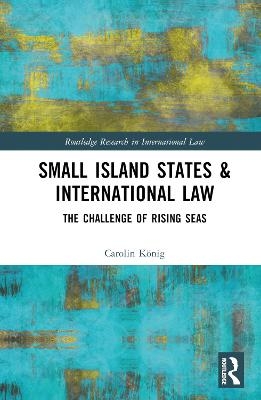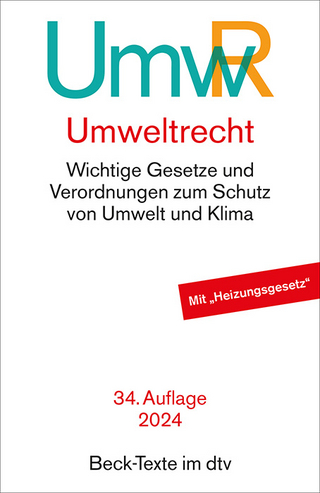
Small Island States & International Law
Routledge (Verlag)
978-1-032-20442-0 (ISBN)
Exploring these issues, this book provides answers to these pressing questions. Focusing on small island states as actors in the international community, it evaluates the challenges that the state as a subject of international law faces in general from globalization and humanization, and what this means for small island states threatened by rising seas. Highlighting the experience of the indigenous peoples of small island states as collectives, and to the individuals living in these states, the book addresses fundamental questions of general state theory and international law, drawing on an extensive body of source material.
As rising sea levels present an increasingly pressing threat to small island states, this book highlights the importance of international protection of the individual and the capacity of international organizations to act within existing international law. It identifies pressing problems where immediate action is required and argues that, in future, the responsibility for protecting individuals could shift to the international community, if a sinking island state can no longer protect its population on its own.
Carolin König works as a lawyer in a law firm specializing in energy law. Her personal focus is on international law and the climate policy aspects of energy law. She studied law at the Ludwig-Maximilians-University of Munich and the Katholieke Universiteit Leuven and holds a PhD in international law. She was a research assistant at the Institute for International Law with a focus on International Human Rights Protection at the University of the German Armed Forces in Munich. She also gained professional experience at the German Foreign Office, in various law firms, including in the field of asylum law, and as legal advisor to the Permanent Mission of the Maldives to the United Nations.
A. Introduction
A Brief Overview of the Science Behind Climate-Change-Induced Rising Sea Levels
Small Island States, the Rising Seas, and the International Community
The Rising Seas and International Law – Open Questions and How to Find Answers
B. What does an Entity Need to Qualify as a State? – or What it Takes to be a State
C. When does a State Cease to Exist? – or What it Takes Not to be a State Anymore
Loss of Territory
Criterion "A Defined Territory" Endangered by the Rising Seas?
Statehood Endangered by the Loss of "A Defined Territory"?
Examples of Rights and Duties Associated with Sovereignty
Sovereign Action on Foreign Territory
a) Cases of Interventionist Actions on Foreign Territory
b) Cases of Tolerated Actions on Foreign Territory
c) Limitations on Action on Foreign Territory as a Consequence
Other Forms of Sovereignty
Conclusion
Examples of "Statehood" without Territory
Non-Territorial Unions
Sovereign Subjects of International Law without Territory
States that Temporarily Lost their Territory
Virtual States
Conclusion
States’ Considerations with Regard to Potential Loss of Territory
Conclusion
Loss of Population
Concluding Thoughts on What it Takes Not to be a State Anymore
D. What it Means to be a State – the Emergence of the Modern State and its Significance Today
Rights of a Modern State
Challenges for the Contemporary Concept of a State
Humanization – the Increasing Importance of the Individual
Globalization – the Decreasing Importance of Territory?
Concluding Thoughts on What it Means to be a State
E. What it Means Not to be a State Anymore – the Consequences of the Loss of Statehood for the State’s Population and the International Community
Loss of Statehood and its Effects on the Respective Populations - Individual and Collective Dimension
Nationality and Why Having a State is (Still) Important for the Protection of Human Rights
Emerging Infringements on the Human Rights of (Indigenous) Peoples from Small Island States due to Rising Sea Levels
Collective Dimension of Human Rights Infringements due to Climate Change
Conclusion
Loss of Statehood - Triggering a Responsibility of the International Community?
Human Rights Approach
Responsibility that Comes with Solidarity
Responsibility to Protect
Causal Responsibility
Responsibility of the One Able to Respond
Conclusion
Concluding Thoughts on What it Means Not to be a State Anymore
F. Closing Remarks
| Erscheinungsdatum | 12.12.2022 |
|---|---|
| Reihe/Serie | Routledge Research in International Law |
| Verlagsort | London |
| Sprache | englisch |
| Maße | 156 x 234 mm |
| Gewicht | 662 g |
| Themenwelt | Recht / Steuern ► Allgemeines / Lexika |
| Recht / Steuern ► EU / Internationales Recht | |
| Recht / Steuern ► Öffentliches Recht ► Umweltrecht | |
| Recht / Steuern ► Öffentliches Recht ► Völkerrecht | |
| ISBN-10 | 1-032-20442-7 / 1032204427 |
| ISBN-13 | 978-1-032-20442-0 / 9781032204420 |
| Zustand | Neuware |
| Informationen gemäß Produktsicherheitsverordnung (GPSR) | |
| Haben Sie eine Frage zum Produkt? |
aus dem Bereich


